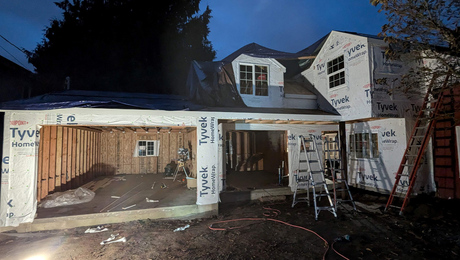*
I need help from someone who knows about such things. I’m going to build myself a new house, doing all the work and design. I need to learn how to estimate the tonnage required so I can spec an appropriate sized a/c unit. Any help would be greatly appreciated.
Discussion Forum
Discussion Forum
Up Next
Video Shorts
Featured Story

The FHB Podcast crew takes a closer look at an interesting roof.
Featured Video
SawStop's Portable Tablesaw is Bigger and Better Than BeforeHighlights
"I have learned so much thanks to the searchable articles on the FHB website. I can confidently say that I expect to be a life-long subscriber." - M.K.














Replies
*
Ed,
I'm building my own car, and I want to know what size engine I need to achieve a 1:10 horsepower to weight ratio.
Smart-ass response, I agree, but the answer in both cases is to contact an engineer. In your case, an HVAC expert in your area who can evaluate your cooling needs from the house plans and the locally prevailing weather.
*Ed, the Consumer Reports site had this great calculator last summer that didi exactlywhat you're asking about. It took into consideration outside walls, inside walls, exposure, window size, ceiling height, trees outside, and much more! I put in all my rooms and it came up with exactly the right btus! I know they were right, because I know in which rooms I should've gotten a bigger a.c., and in which rooms the a.c. was more than adequate. Of course, this was for room air conditioners; don't remember if they had something similar for central.I don't know if the calculator is still there, but you could go to the site and e-mail them about it.Any company that installs central units can tell you what you want to know, but I'd make sure and geti lotsof estimates.PattyHey, Barry, are you an engineer? ; )
*Ball park about 18,000 Btu/hour per 1000 ft. sq. in the Midwest. If you want to be dry and not cold, see if you can get away with a 24,000 Btu evaporator/18,000Btu condensor. You can calculate all the heat loads, etc., but it is still dependendent on a given temperture and humidity, etc. The higher rated condensor gives more drying for a given amount of air conditioning at a given temperature. It means you don't have to freeze to death to dry the place out. I am not an expert, don't pretend to be one, but have done two of my own buildings, one with four zones one of which has a double staged condensor. They work fine. You can gen engineering books and do all the calculations, but it still depends on how the sun shines and what the humidity is. In all cases, unless you use a re-heat system, it is difficult to get the right temperature when the outside air is at about the same temperature as the thermostadt is set for on the inside. Now, I wrote all that just to keep the more precise types from wondering if I really have done some of this. If I do the other side of my Wisconsin duplex this summer, I plan on using a roof-top unit. This is something to think about as the entire unit is engineered to work together (so much for sizing the condensor and evaporator differently) and there are no freon connection charges - which in my case cost $250 last summer with no plumbing of lines. Here 24,000 Btu are available for about $1,200 (this is from memory and is plus minus $200) and includes gas heat. Just a thought.Dennis
*
I need help from someone who knows about such things. I'm going to build myself a new house, doing all the work and design. I need to learn how to estimate the tonnage required so I can spec an appropriate sized a/c unit. Any help would be greatly appreciated.